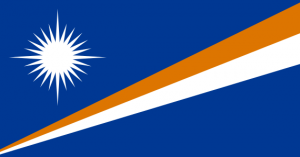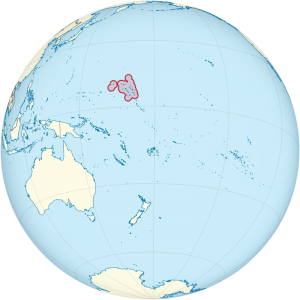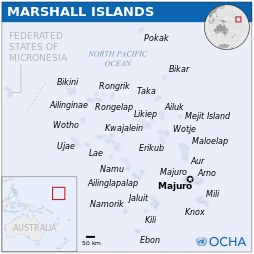General Business Information

The Republic of the Marshall Islands (RMI) is a nation of about 60,000 people living on 29 coral atolls and 5 low-lying islands in the central Pacific, mid-way between Hawaii and Australia. The RMI adopted its Constitution in 1979 and signed the Compact of Free Association with the United States in 1986. The RMI became a member of the United Nations in 1991.
The natural beauty and rich culture of the RMI attracts tourists from around the world. Pristine coral reefs teeming with marine life make the RMI a premiere dive destination. Yet our country faces formidable challenges in the form of rapid population growth and accelerated sea-level rise, among others. The RMI offers great potential for small-scale tourism and economic investment. The country’s open investment climate and close relationship with the United States under the Compact of Free Association make it particularly attractive to investors, which in turn help further the ultimate goal of sustainable economic development. [Source: The Republic of the Marshall Islands Embassy]

US assistance and lease payments for the use of Kwajalein Atoll as a US military base are the mainstay of this small island country. The Marshall Islands received roughly $1 billion in aid from the US during 1986-2001 under the original Compact of Free Association (Compact). In 2002 and 2003, the US and the Marshall Islands renegotiated the Compact’s financial package for a 20-year period, from 2004 to 2024. Under the amended Compact, the Marshall Islands will receive roughly $1.5 billion in direct US assistance. Agricultural production, primarily subsistence, is concentrated on small farms; the most important commercial crops are coconuts and breadfruit. Industry is limited to handicrafts, tuna processing, and copra. Tourism holds some potential. The islands and atolls have few natural resources, and imports exceed exports. Under the amended Compact, the US is also funding, jointly with the Marshall Islands, a Trust Fund for the people of the Marshall Islands that will provide an income stream beyond 2024 when direct Compact aid is to end. [Source: CIA World Factbook] National defense is primarily the responsibility of the United States. [Source: The Republic of the Marshall Islands Embassy]
The RMI is classified by the United Nations as a Small Island Developing State. The economy relies heavily on RMI Government and US military expenditure and employment. The Government of the Republic of the Marshall Islands wishes to encourage private sector development to help meet its development goals. These goals include employment generation, human resource development, generation of foreign exchange, and import substitution. It is particularly interested in encouraging private investment in its fisheries, tourism, manufacturing and agriculture sectors. The Government appreciates that the domestic private sector alone is not yet able to contribute sufficiently in this regard. It therefore is actively seeking direct foreign investment to assist the country meet its goals.
Fast Facts
|
Capital |
Majuro |
|
Time zone |
MHT (UTC+12) |
|
Area |
70 sq. mi. (181 sq. km.) |
|
Population |
70,983 |
|
Climate |
Hot and humid |
|
Official Languages |
Marshallese, English |
|
Currency |
US dollar |
|
Government |
Unitary parliamentary republic in free association with the US |
|
GDP per capita |
$8,700 |
|
Labor force |
$10,840 |
|
Unemployment rate |
36% |
|
International dialing code |
+692 |
|
Internet domain suffix |
.mh |
|
Quality of life |
Limited economic & medical resources |
|
Doing Business rating |
114 (of 189) |
|
Starting a business rating |
56 |
Establishing a Business

Business Licenses
For a foreign investor to do business in the Marshall Islands as an individual, a partnership, a joint venture, or a corporation (domestic or foreign), the investor must first obtain a Foreign Investment Business License.
Application forms for a Foreign Investment Business License may be obtained from the Registrar of Foreign Investment in the Office of the Attorney General.
Applications are then reviewed by the sectorial Ministries and Agencies.
The process of review and approval normally takes no longer than four to six weeks (often less).
The National Government does not require foreign investors to obtain any other licenses, unless they are involved in regulated activities (e.g., the practice of law, the practice of medicine, banking, fishing, fishing base operation, etc.).
If a business entity has a Foreign Investment Business License, it need not obtain a business license from the local government in whose jurisdiction it operates for a period of one year from the date of issuance of the foreign investment license.
Forming a Corporation
Domestic Corporation: Often, at the same time that foreign investors apply for a Foreign Investment Business License, they will create a domestic corporation through which to do business in the Marshall Islands.
Articles of incorporation and bylaws are filed with the Registrar of Corporations who in turn submits them to the Cabinet for approval.
Information regarding incorporation can be obtained from the Registrar of Corporations, located in the Office of the Attorney General. [Source: The Republic of Marshall Islands Embassy]
The Five-Step Process
1. Check the uniqueness of the proposed company name
2. Register the company with the Registrar of Corporations
3. Have company charters and documents notarized
4. Obtain the employer identification number at the Marshall Islands Social Security Administration
5. Apply for a business license from the relevant licensing authority [Source: The World Bank]
Incentives under the Compact of Free Association with the United States
As a general rule, all articles wholly grown, made or produced in the Republic of the Marshall Islands have duty-free access into the United States except for the following categories of products:
- Watches, clocks and timing apparatus provided for in Chapter 9.1 of the Harmonized Tariff Schedule of the United States;
- Buttons (whether finished or not finished) provided for in item 9606.21.40 of the above named Tariff Schedule;
- Textile and apparel articles which are subject to textile agreements;
- Footwear, handbags, luggage, flat good, work gloves, and leather wearing apparel which were not eligible for the Generalized System of Preferences in the Trade Act of 1974, and; Tuna canned in oil.
Articles exported from the RMI qualify for this duty-free treatment if sum of the cost or value of the materials produced in the RMI, and the direct costs of processing operations performed in the RMI are not less than 35% of the appraised value of the merchandise at the time of its importation into the United States. In other words only 35% of the customs value of the U.S. import must be contributed in the Marshall Islands. As much as 15% of the value of the product may be contributed to this 35% added-value requirement when materials produced in the customs territory of the United States are used.
The cost of processing operations in the RMI can include the following:
All Actual labor costs involved in the growth, production, manufacture, or assembly of the specific merchandise, including fringe benefits, on-the-job training, and the cost of engineering, supervisory, quality control, and similar personnel;
- Dies, molds, tooling, and depreciation. Oil machinery and equipment which are allocable to the specific merchandise;
- Research, development, design, engineering, and blueprint costs insofar as they are a allocable to the specific merchandise, and;
- Costs of inspecting and testing the specific merchandise.
Products produced in the RMI are also not presently subject to any quota restrictions into the U.S. market. This is particularly relevant in the area of textile production. Textile imports into the U.S. are generally subject to highly restrictive quotas based on the country of origin. [Source: The Republic of Marshall Islands Embassy]
American Corporate Services offers experience and expertise for astute investors who wish to establish offshore businesses. Whether an investor wishes to immigrate or simply to establish a business entity, our network of professionals has the ability to advise, assist, direct and enable clients to understand and navigate the process for Marshall Islands company formation.
Our services include everything you need for starting a new business in the Marshall Islands.
In addition to helping to establish a Marshall Islands business bank account, helping you set up your business to conform to Marshall Islands accounting standards and to comply with Marshall Islands taxes, we also offer boutique amenities such as Marshall Islands secretarial services. We can even help you to create a Marshall Islands virtual office that will appear to others as though you are actually in the Marshall Islands, even though you may be just about anywhere else on the globe at the time. Our business is making your investment a success.
